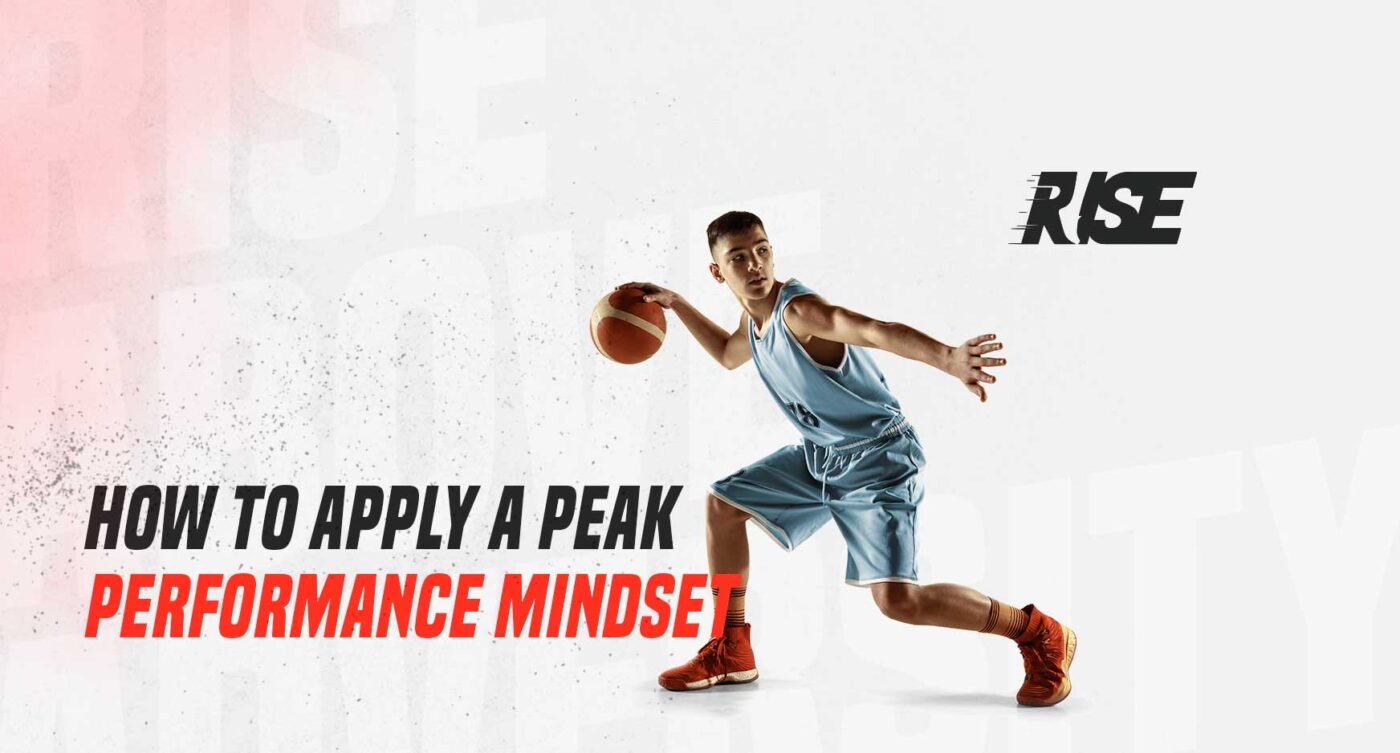“Victory is in knowing you’ve done your best. If you’ve done your best, you’ve won.” – Billy Bowerman
Leadership Mentor Ben Crowe, who has worked with some of Australia’s greatest sporting stars such as Wimbledon Champion Ash Barty, Surfing legend Steph Gilmore and Richmond Tigers Footballers Dusty Martin and Trent Cotchin describes the peak performance mindset as a balance of focusing on the things we have control over in competition while showing up as the best version of ourselves.
Most performances are sabotaged by the fear of failure or focusing on the result. While the result is important, focusing on the end game can create unrealistic expectations that are out of our control. The fact is, there is a process to achieving a desired result that requires an attention to the details of the present moment.
Understanding and accepting what we can’t control and focusing our thoughts back on the things we can control as well as showing up the best version of ourselves creates a sense of calm, clarity, and composure within.
So what are the things we do have over control in performance?
Well to understand this better let’s start with the factors that we have no control over. Basically, anything external of us we have little to no control over in competition. These include the other competitors, the coach, teammates, the crowd, the referees / umpires, the weather, the venue, and even unforeseen accidents. Even factors, such as injury and winning we can only influence, not control.
On the other hand, everything that we can control (or at least influence) resides within us. We get to choose the following…
- Our thoughts:
We get to choose what we think. Our thoughts are simply energy – so we can focus our energy on elements that help produce our best performance or we can focus our energy on elements that hinder us. In the same way that our physical energy can be drained, a wave of negative thoughts can have us feeling fatigued and exhausted. Many of our thoughts have been practiced so much that they become a habit at the subconscious level – meaning that we are not consciously of the thought. We can become better at choosing our thoughts through the practice of mindfulness.
“The further we get from distraction, the closer we get to success.” – Brendan Burchard
- Our Feelings:
Our feelings / emotions create a physical response in the body, so we generally take action from that feeling. The action that we take from anger, frustration, or self-doubt differs from the actions that we take from joy, gratitude, or confidence. An emotion can last up to 90 seconds before it dissipates. Our thoughts create emotion so we have the choice to hold onto that emotion (which is more common than not) or choose a thought that creates a different emotion within.
- Our Perceptions:
Our perceptions are how we interpret, organize and even respond to situations. Our perceptions of performance can be influenced by past experiences, mood or emotional state, self-concept, and also by our expectations. Perceptions are basically a thought that has been practiced over and over to create our own personal view of a situation and how we respond. Once again, since thought is at the core of perception, we get to choose how we perceive a situation in order to get the best out of ourselves at that moment.
- Our Behaviours:
Behaviour is different from emotions but they are strongly influenced by them. Emotions make us feel but they also make us act. This is due to changes in our autonomic nervous system and associated hormones in the endocrine system that anticipate and support emotion-related behaviours. For example, adrenaline is released in a fearful situation to help us run away from danger. At its core, this happens at s subconscious level. Behaviour is automatically controlled by the subconscious mind’s programs when the conscious mind is not focused on the present moment. A great example of this is in our breathing. We can leave it to our subconscious mind to keep us alive or we can consciously take control and even change the pattern of our breathing.
- Our Decisions:
Similar to our behaviours, decisions can be made at a conscious level or left to our subconscious mind (a.k.a. our habit mind). We get to choose our levels of preparation, effort, and attitude when it comes to sports performance. Our decisions (like our thoughts) create feelings that dictate our behaviour which leads to our results. While outside sources may influence decision-making, ultimately the true power of choice is ours.
While it is inevitable to face challenges and adversity in competition, we still get to decide where we focus our thoughts. In the same manner that your coach may have a game plan for your opposition, you should have a game plan for yourself. Negative emotions come from the internal fight against factors that lie outside of our control. It is these same emotions that obstruct our full potential in performance. Once we recognize these emotions, we can re-direct our thoughts. It is as simple as asking yourself “Can I control this?” If the answer is no, let it go. Where focus goes energy flows.
“Accept what is. Let go of what was. And have faith in what will be.” – Sonia Ricotti
The second part of a peak performance mindset involves showing up as the best version of ourselves. So, what does that look like?
No matter the situation we are in, our brain is constantly looking for parallels to how it will process the present reality as part of the habit mind. Psychology says the way we do one thing is the way we do everything – meaning the way we manage stress, the way we motivate ourselves and even the way we do fear is similar in life situations and sports.
In order to find out the best version of you we must align the best version of you in life with the best version of you in sports. Here’s a simple exercise you can do:
- For the rest of 2023, what kind of human do you want to be?
This isn’t just about your goals but more so how you want to feel about yourself as well as the impact that you leave upon others. When people ask about you what would you like your friends, family, and the people you impact the most to say about you?
2. Who are you at your absolute best?
How would you describe yourself at your absolute best? Are you confident? Are you funny? Think about memories that have made you feel good. Because it is not the external circumstances that we remember the most but how they made us feel.
3. What 3 words come to mind?
Condense who you want to be in 2023 and who you are at your absolute best into 3 distinct words. This makes them easy to remember and keeps the mind clear and clutter-free to get the best out of yourself in competition.
4. What sort of athlete do you want to be?
Now “join the dots” between the way you want to be and the things you love to do. For example, Richmond Tigers Football Star uses the words “Strong. Aggressive. Unstoppable.”
“Remember, you have been criticizing yourself for years and it hasn’t worked. Try approving of yourself and see what happens.” – Louise Hay
As a human species, we always want to feel good. When we are hungry, we eat and that makes us feel good. When we are tired, we sleep and that makes us feel good. When we are cold, we warm ourselves up and that makes us feel good. As an athlete winning feels good. Performing well feels good. But these factors aren’t always within our control.
What is within our control is how we feel about ourselves though. Our self-value. Our self-worth. So, no matter what happens in performance, if you just focused on those three words – who you want to be… that is the ultimate win.
Winning is knowing that you’re entirely worthy of pursuing your goals and your dreams, no matter if you achieve them or not.
– 𝒞ℴ𝒶𝒸𝒽 𝒞𝒶𝓁.

